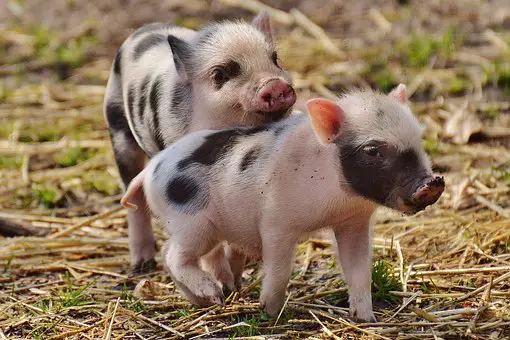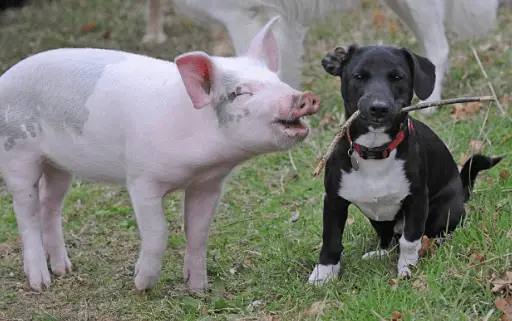Times have changed and people are into pigs as pets nowadays. Since they’re quite unusual pets, we are still unfamiliar with their behavior.
Are pet pigs destructive? Yes, they CAN be destructive if not given a proper care and attention. Pigs are intelligent creatures so they are capable of feeling emotions. They can get bored, depressed, grumpy, hyper, stubborn and demanding.
They have almost the same intelligence level as a two year old child. When not given much attention, they have a tendency to get lonely or bored.

Such feelings could lead to destruction of objects within the house if they are kept as house pets. They are known to be capable of making a mess if they feel like it.
Destructive behavior is a sign of stress or improper caring for the pet.
As long as an owner knows how to properly care for their pet pig, the destructive tendencies won’t be a problem at all.
To avoid this type of behavior, it’s important to know how to care for a pet pig.
ARE PIGS GOOD PETS?
Since there goes the question about their destructive behavior, it’s also normal to wonder if they can still be good pets despite the bad reputation that pigs have.
Thankfully, the stigma around pigs is slowly clearing up lately.
There are a lot of good reasons why pigs can be great pets.
- Pigs are intelligent, social and can be house trained.
Some scientists even say that pigs are smarter than dogs and other primates! Like explained above, their intelligence allows them to feel emotions like we do.
You can train them to use the litter, play fetch and go on walks and more!
A few studies even say that they can work well as an emotional support animal or the role of a therapy animal. They can help reduce depression.
They might like cuddling and sitting on your lap at times!
There are videos all over the internet showcasing how cute and sweet these animals can be, so they definitely can make good house pets.
Pigs can also get along with other house pets such as cats! As for dogs, you need to be careful and observe how they will get along with each other.
They are prey animals and can be threatened by a large predator animal like dogs.
Give them enough time to warm up with each other and eventually, you’ll find your pet pig and other pets having a good time together!
2. Pigs are clean
Contrary to the popular belief that they are dirty and messy, pigs actually turned out to be one of the cleanest farm animals.
The only reason pigs like to roll in mud is to keep them cool and protect themselves from parasites like flies
Pigs have a hard time cooling off because they are unable to sweat.
As long as you get them used to warm baths, your pig will stay cool. Just like us, they are animals that want to stay clean too.
Having a messy environment could attract parasites and also make your pig feel irritated which leads to the destructive behavior discussed above.
They can’t handle extreme cold or extreme heat, so keep them in an averagely warm or cool room for the sake of their health.
3. Pigs are not picky eaters.
Just like us, pigs are omnivores. But there is one important reminder about this.
Pigs are not allowed to eat meat.
Why? It’s the easiest way for them to be infected by a disease coming from the meat. Please do not feed them any kind of meat or food that has had contact with meat.
A sick pig could behave negatively, so it’s important to watch their health.
Pigs can eat almost anything. However, they must have a varied diet in order to stay fit and in shape. Obesity is actually the most common issue among pet pigs; therefore they must be given with proper diet.
You can feed them many kinds of fruits and vegetables.
Most pigs are known to love cooked broccoli! Though some may not like it, it’s worth the try. The best feed for a pig is a real pig pellet where they can get all the nutrients they need.
Other than that, pigs eat grass and insects too.
Knowing this, you can let your pig outside your lawn or backyard to graze on grass. At times, they would dig up the ground to find insects and eat them as snacks.
You may also pick up acorns or other nuts to give them as snacks.
A starving pig might act grumpy or stubborn that’s why it’s important to know what they eat.
COMMON PIG BEHAVIORS
Studies say that a pig can become more “aggressive” if they are raised in a way that they are locked up most of the time. Learn about common pig behaviors and why they do it.

- Pigs are curious animals.
Due to their intelligence, it’s no surprise for them to become curious.
Since they are curious, giving them enough space to walk around or a room to explore could greatly contribute to their mental health.
If they are locked up, tied up or cooped up in one are for too long, they tend to become aggressive, lonely, depressed, stressed, grumpy or stubborn.
Studies say that animals have freedom tend to be happier and healthier than those who are frequently locked up or chained.
They are living creatures too and have the right to freedom.
Even as pets, give them enough space. If not, an alternate solution is to take them out on walks! This is also exercise for your pet and could be a bonding activity between the two of you.
While on walks, they can get enough sunshine that they need and the opportunity to graze on grass or search for insects for extra snacks.
- Tail wagging, grunting & communication
If you see your pet wagging their tail, that means they are happy and contented.
Grunting could mean a couple of things.
It could mean that they are anxious, threatened, struggling, in pain or just being playful.
Their way of communication heavily relies on body language as they are not very vocal like cats or dogs.
Pigs have poor eyesight, so to compensate for it they are born with a great sense of smell. This makes their noses (or snouts) sensitive to touch, so avoid touching their nose improperly.
They are also capable of crying real tears when they feel too sad or depressed.
If this happens, see a veterinarian if you think it could be a medical reason or if they are possibly in pain and could not figure out what’s wrong.
- Pigs are sensitive
If raised without a companion, they can become lonely and sad.
If they had a companion that left or passed away, they are aware of this and capable of missing someone. They know when something is missing and knows how to grieve, which explains the crying.
A mistreated or abused pig could behave negatively.
They may tend to be destructive and aggressive. This takes time and patience. Let the trauma get healed and they will be normal pigs again.
Pigs can empathize and be compassionate which is why they can be a therapy animal. They are able to sense sadness from others like dogs and may sometimes console them for comfort.
Those that were abandoned can get depressed to the point where they will refuse to eat and starve themselves to death.
RELATED QUESTIONS
Are pigs dangerous?
No, in general, domestic pigs are friendly or neutral most of the times to the point you can even allow them near children.
They’re very similar to dogs in behavior.
Though they are capable of biting, it rarely happens and probably only does when they are hurt, mistreated or threatened.
Pigs are prey animals and they would rather prioritize fleeing than facing danger themselves as it is too risky. Their only way of fighting is charging with their tusks if they have one and biting if they can reach.
Their aggression could also depend on the type of breed. Since most breeds are now domesticated, not many of them are dangerous.
Sometimes, it could also depend on their age or how they were raised.
Piglets that grew up lonely without social interaction tend to be unfriendly towards people and even other pigs. Older pigs could also be a bit aggressive when it comes to having an alpha male status.
However, another reason that they could be “dangerous” is if they are sick or carrying a disease.
Which is why, it’s important to have them checked medically and get vaccinated too.
Is it legal to own a pig?
The answer depends on where you live. Laws differ on every country especially regarding animal welfare. It’s highly recommended to check with your local officers to verify first before you adopt a pig.
If it requires a license, please register your pig for its safety and yours too. It might also come with various benefits, so it’s worth the cost. For more information, we have a helpful article on this.
